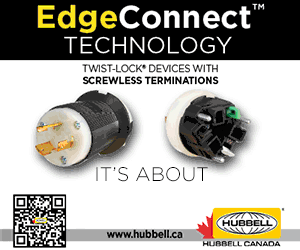| |
| |
 |
 |
| |
 |
|
@{mv_date_MMM d, yyyy}@ |
|
| |
 If you’ve not yet met Matt MacInnis, consider this your official introduction to the president of the Electrical Contractors Association of BC. We caught up with MacInnis to learn about the state of things in British Columbia (electrically, of course), and ECABC’s priorities in the coming years. Right out of the gate, he told us two of the biggest topics are housing and climate change, and the work of electrical contractors “is really fundamental to both”.
» Read more
If you’ve not yet met Matt MacInnis, consider this your official introduction to the president of the Electrical Contractors Association of BC. We caught up with MacInnis to learn about the state of things in British Columbia (electrically, of course), and ECABC’s priorities in the coming years. Right out of the gate, he told us two of the biggest topics are housing and climate change, and the work of electrical contractors “is really fundamental to both”.
» Read more
Legrand has acquired Encelium, an Ontario-based manufacturer of advanced commercial lighting controls. “The synergy with Encelium was evident from the start—not only from a product and innovation standpoint, but from their ‘people first’ approach that drives their innovation, and their commitment to enhancing the experience of everyone that comes in contact with their products,” said Andrea Lamieri, general manager, Building Control Systems, Legrand.
» Read more
|
| |
|
| |

|
| |
 |
 |
| |
|
| |
 Designed and built in Ontario, Project Arrow—the first all-Canadian, zero-emission connected vehicle—makes use of the province’s “complete end-to-end automotive supply chain”, says the Ministry of Economic Development, Job Creation and Trade, and demonstrates the province’s “world-class automotive capabilities and innovation on a global stage”. Over the course of the project, 58 Canadian industry partners came together to design and build a “revolutionary prototype vehicle”.
» Learn more
Designed and built in Ontario, Project Arrow—the first all-Canadian, zero-emission connected vehicle—makes use of the province’s “complete end-to-end automotive supply chain”, says the Ministry of Economic Development, Job Creation and Trade, and demonstrates the province’s “world-class automotive capabilities and innovation on a global stage”. Over the course of the project, 58 Canadian industry partners came together to design and build a “revolutionary prototype vehicle”.
» Learn more |
| |
| |
 |
 |
| |
|
| |
 Ottawa announced two initiatives in Alberta and Saskatchewan that, according to Public Services and Procurement Canada, support its commitment to “investing in” renewable energy and achieving the goal of net-zero emissions by 2050. PSPC says Canada is also developing a procurement strategy to buy the equivalent of 128,000 MWh per year-worth of new clean energy generation, which would enable the feds to attribute their energy consumption as being clean in regions where “new clean renewable sources are not yet available”.
» Learn more
Ottawa announced two initiatives in Alberta and Saskatchewan that, according to Public Services and Procurement Canada, support its commitment to “investing in” renewable energy and achieving the goal of net-zero emissions by 2050. PSPC says Canada is also developing a procurement strategy to buy the equivalent of 128,000 MWh per year-worth of new clean energy generation, which would enable the feds to attribute their energy consumption as being clean in regions where “new clean renewable sources are not yet available”.
» Learn more
The federal government is accepting applications from not-for-profit organizations, public institutions and governments to locally deliver federal funding from the Zero-Emission Vehicle Infrastructure Program. These partners will redistribute up to a maximum of $5 million of ZEVIP funding for local electric vehicle infrastructure, including chargers. They will redistribute a maximum of $100K per project to local partners. Applications are being accepted now.
» Learn more
|
| |
 |
 |
| |
|
| |
|
|
| |
| |












